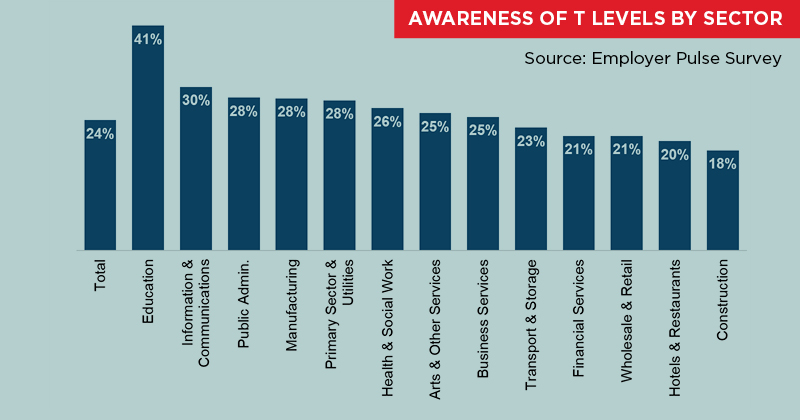Employers are losing interest in T Levels, a new study has found.
A survey of 5,000 employers carried out by government researchers has found that interest in providing T Level placements declined by six percentage points between 2019 and 2021, from 36 per cent to 30 per cent.
The “employer pulse survey” was conducted between July and November 2021 and asked employers about a range of topics related to skills and training. It was last carried out in 2019 and researchers compare the results to previous employer surveys, such as the employer skills survey (ESS) and the employer perspectives survey (EPS).
Three quarters of employers had not heard of T Levels
Just three per cent of employers said they had good knowledge of T Levels, eight per cent said they had some knowledge and 13 per cent said they were “aware, but do not know what they are”.
Figures showing T Level awareness by sector reveal low levels of knowledge even in industries that have been engaged with T Levels since the early stages of their roll-out, from 2020.
Construction industry employers reported the lowest levels of awareness (18 per cent) and, perhaps unsurprisingly, employers in the education sector reported the highest level of awareness, although even that was only 41 per cent.
A key component of the government’s flagship technical education qualification is the mandatory 45-day industry placement.
In 2019, 57 per cent of employers said they were not interested in offering T Level industry placements; 21 per cent were “not very interested” and 35 per cent were “not at all interested”.
Results from the 2021 survey paint a worrying picture. Overall, 63 per cent of employers reported that they were not interested in offering T Level placements, a six percentage point increase. The proportion of employers who said they were “not at all interested” increased from 35 per cent in 2019 to 41 per cent in 2021.
Even the offer of the £1,000 incentive payment currently available to employers hosting T Level placements didn’t appear to pique employers’ interests.
Employers who said they weren’t interested in offering T Levels were told about the incentive payments and asked again whether they would be tempted to offer placements.
Researchers found that only seven per cent changed their minds.

Other notable findings from the research:
Employers continue to be more likely to use private sector training providers than public providers, but the proportion has reduced from 60 per cent in 2016 to 49 per cent in 2021.
Awareness of traineeships increased to 56 per cent from 45 per cent in 2019.
Despite this, the main reason given by employers for not providing traineeships was “lack of awareness”, cited by 50 per cent of employers.
There was a slight increase, three percentage points, in the number of employers saying that “structural barriers” were their main reason for not offering apprenticeships. The most common of these was a perception that apprenticeships were not suitable for the size of their business.
Just over one-third, 35 per cent, of employers said they were “actively choosing” not to offer apprenticeships. The most common reason reported was because “all staff were fully skilled”.
And more than a quarter, 27 per cent, said that “training providers not offering the right skills areas or levels” was at least part of the reason for them not offering apprenticeships. This was most common in the transport and storage sector (36 per cent) and in manufacturing (33 per cent).

















Your thoughts